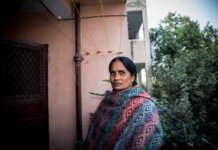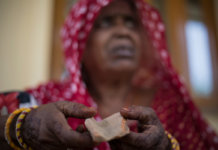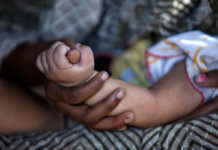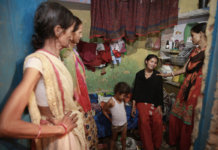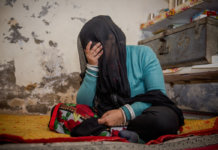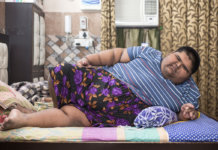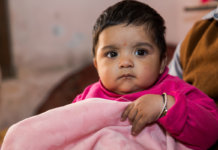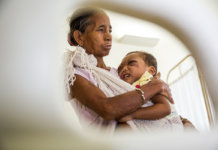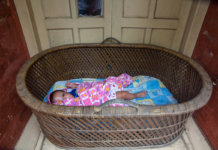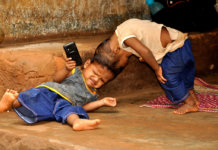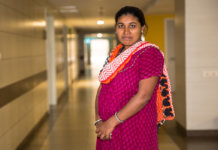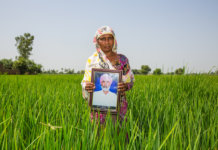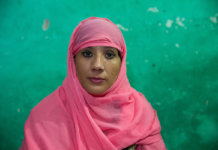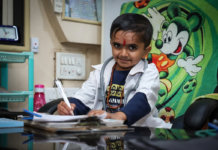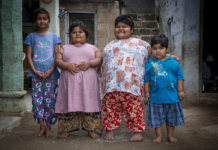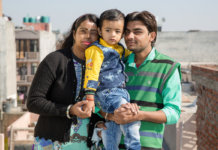The real-life mother behind the Hollywood blockbuster Lion has spoken of her pain at losing her five-year-old son – and her unshakeable belief that he would come home to her 25 years later.
Fatima Munshi lost her tiny son Saroo and his 14-year-old brother Guddu on the same night in 1987 as they took the train to scavenge for food in a neighbouring village in central India.
Saroo fell asleep on the train and woke up 1,000 miles from home in Calcutta. Lost and confused, he spent weeks on the streets before being taken in by an Indian orphanage which arranged for him to be adopted by Australian parents. He was raised 6,000 miles away in Tazmania.
But Saroo never gave up hope of finding his real mother, and used Google Earth to track down his hometown, eventually being reunited with his mother in 2012.
Now, the heartbreaking quest to find Fatima has been turned into a blockbuster movie Lion starring Nicole Kidman and the Oscar nominated Dev Patel.

Fatima, 60, explained how she lived a nightmare for 25 years, not knowing whether Saroo was dead or alive. She said: ‘I was speechless and numb when I saw him again. It was like meeting God.
‘I died a little every day in those 25 years without him,’ she said.
‘Life seemed so incomplete and painful without him. I searched for him everywhere but failed to find him.’
The incredible story began when Saroo, now 36 – then known as Sheru Munshi Khan – left his impoverished family home in Ganesh Talai, a tiny village near the town of Khandwa in central India, with his older brother Guddu on an hour-long train to the nearby town of Burhanpur.
When they arrived, Saroo was so exhausted that his brother told him to take a nap at the station while he went to scavenge food.
It was the last time he ever saw Guddu.
When Saroo awoke, the station was deserted and his brother was gone.

All alone, Saroo climbed onto an empty train carriage in an attempt to find his way home, half believing his brother would be on the train.
Panicky and alone, he fell asleep, and woke with the sun glaring into his eyes as the train rattled along the tracks miles from home. He was heading towards Calcutta, nearly 1,000 miles away from the poor but close family he cherished.
For weeks, the five-year-old Saroo lived on scraps of food and boarded random trains, hoping that he would be lucky enough to board one that would take him home.
Eventually he was taken in by the Nava Jeevan orphanage, where he spent two months and where the Indian Society for Sponsorship and Adoption arranged for him to be adopted by a Tasmanian couple, Sue and John Brierley, played in the film by Nicole Kidman and David Wenham.

Meanwhile, his mother, Fatima, had never lost hope that her son was alive.
‘I was given the body of my other son a month after the two went missing. But I never got Saroo’s body,’ she said.
‘I always feared, where he could be? Terrible thoughts passed through my mind, whether he was alive or dead, whether he was in good company or not.’
‘I was always worried. But a mother’s instinct said he’d return one day.’
As the years passed, Saroo enjoyed his new life in Australia where he was sporty and made friends easily.
But he never forgot his family and the village he had once called home. He had vague memories and images of landmarks in his mind.
But it was a quarter of a century before Saroo took to Google Earth to finally find his birthplace.
Recollecting names and places, he began to obsessively pore over Google Earth every night, searching a virtual India for traces of his lost home and family.

Eventually, in March 2011, Saroo hit the jackpot. He travelled to India for an emotional reunion with his beloved mother.
She knew it was her son the moment she laid eyes upon him thanks to a tell-tale scar on his forehead.

Fatima recalled: ‘I was cleaning the dishes at someone’s place when a neighbour came running to me shouting my son was home.’
‘I yelled at her for making a joke of my emotions. But she dragged me out of the house and took me to him.’
‘When I saw him I was numb. His eyes were the same, the injury mark on his forehead said it all. I needed no further indication that my prayers were finally answered.
‘The first thing he said was ‘Ma’, and then we hugged each other for hours. We did not speak, just held each other. Then my neighbours started celebrating.’
She added: ‘It was the most beautiful moment of my life. I was so happy to see that his love for his family has not changed. I felt so proud to call him mine.’
Fatima remembered her son as a sensitive, intelligent yet mischievous child, and was delighted to discover that his personality was recognisable even after all those years living another life on another continent.

‘He often did naughty things but was extremely affectionate towards everyone,’ she recalled. ‘He used to beg on trains along with his brother to help me with money, as I was the only earning member of our family after his father left me.
‘I am so happy to see that his love for his family has not changed. I feel so proud to call him mine.’
Saroo required the use of a translator, as he had forgotten his native language completely. Nonetheless, he spent 11 days with his mother.

‘Those days were the most beautiful days,’ Fatima recalled. ‘I cooked all his favourite dishes that I remembered, like egg curry, dal and fish. I knew he always relished my food and he still did. He even took recipes off me.
‘We now talk every day, with the help of a translator, and I look forward to seeing him again. I cannot wait until his next visit.’
Fatima said she was filled with gratitude for Tasmanian couple John and Sue Brierley, who took Saroo into their home.
‘I’d like to thank his Brierley family for raising my child so well,’ she said. ‘He has done really well in life, and it’s all thanks to this lovely couple. I am so glad Saroo has not one but two mothers who love him very much.’

